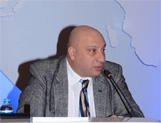
Why Azerbaijan Is Trying to Rekindle Israeli-Turkish Ties?  By Fuad Shahbazov, Baku-based independent regional security and defence analyst
By Fuad Shahbazov, Baku-based independent regional security and defence analyst
The recent normalisation deals between Israel and the United Arab Emirates (UAE), Bahrain, Morocco, and Sudan signify substantial changes in the Middle East. The new agreements were signed following substantive negotiations on several security-related issues, including Iran and Turkey’s growing influence. However, unlike their Arab counterparts, both Ankara and Tehran denounced the Abraham Accords, labelling them as a betrayal of the Palestinian cause and a “dagger in the back of Muslims. Nevertheless, media reports in December 2020 revealed that Turkey and Israel had established a secret channel for negotiations to prepare a roadmap to further bilateral relations. READ MORE
- EGF Editor |
Published on EGF: 08.02.2021
| External Relations
-
Key Challenges for the Armenian Foreign Policy in 2021  By Benyamin Poghosyan, PhD, Chairman, Center for Political and Economic Strategic Studies
By Benyamin Poghosyan, PhD, Chairman, Center for Political and Economic Strategic Studies
2020 was disastrous for Armenian foreign policy. The defeat in the 2020 Karabakh war which resulted in the November 10 capitulation has sent shock waves across Armenia and Diaspora. Within only 44 days Armenia lost what it gained during the 1992 – 1994 first Karabakh war. Significantly reduced Nagorno Karabakh was effectively turned into a Russian protectorate and its current status can be compared with Karabakh status in 1989 when the Soviet Union put Karabakh under the direct Kremlin control through the establishment of the Special Committee led by Mr. Arkadi Volski. Now approximately 3000 square kilometres of territory with some 100,000 Armenians there is again de facto governed by the Kremlin, while the head of the Russian peacekeeping mission LtG Muradov had assumed the role of Volski. READ MORE
- EGF Editor |
Published on EGF: 26.01.2021
| External Relations
-
Perspectives of the US-China relations: Implications for Armenia  By Benyamin Poghosyan, PhD, Chairman, Center for Political and Economic Strategic Studies
By Benyamin Poghosyan, PhD, Chairman, Center for Political and Economic Strategic Studies
The four years of President Trump’s rule will most probably remain in the history of the United States as years of unprecedented turmoil. It started from Presidential executive orders to ban visas for several countries, continued with the tumultuous Russian investigation and impeachment process, almost permanent skirmishes with the key US allies, and ended up with an attack on the Capitol, suspension of the incumbent US President’s Twitter, Facebook and Instagram accounts, and the prospects of the second impeachment in the last days of the current administration. These extraordinary developments may force many to conclude that President Biden will make significant policy shifts in all major domestic and external issues. READ MORE
- EGF Editor |
Published on EGF: 19.01.2021
| External Relations
-
The Role of the ESP in Gazprom’s European Sales Strategy  By Jack Sharples, PhD, Research Fellow of the Oxford Institute of Energy Studies and EGF Associate Researcher on the External Dimensions of Russian Gas
By Jack Sharples, PhD, Research Fellow of the Oxford Institute of Energy Studies and EGF Associate Researcher on the External Dimensions of Russian Gas
Gazprom Export launched its Electronic Sales Platform (ESP) in the context of an increasingly competitive European market. Sales volumes have grown, and have averaged 2 bcm per month since April 2019. As a result of this growth, the ESP is now a key part of Gazprom’s European sales strategy: It generates additional sales revenues, optimises Gazprom’s use of is physical export infrastructure, and provides a constant flow of valuable market data that informs Gazprom’s wider sales strategy. Sales are largely concentrated in four countries, while deliveries are split between Ukrainian and non-Ukrainian routes. ESP sales prices closely track European hub prices for comparable products, and the sales volumes show that Gazprom’s counterparties consider the ESP an attractive offering. The operation of the ESP highlights the crucial element of Gazprom’s European sales strategy: The importance of nuanced optimisation, as Gazprom seeks to maximise its sales volumes without placing excessive downward pressure on European hub prices that would impact revenues from its hub-indexed LTC portfolio. Overall, the ESP demonstrates how far Gazprom has evolved in the past decade, as it seeks to retain market share on an increasingly competitive European market. READ MORE
- EGF Editor |
Published on EGF: 22.12.2020
| Energy
-
New Twists in Armenian-Russian Relations  By Benyamin Poghosyan, PhD, Chairman, Center for Political and Economic Strategic Studies
By Benyamin Poghosyan, PhD, Chairman, Center for Political and Economic Strategic Studies
Armenia-Russia relations have been the cornerstone of Armenian foreign policy since Armenia’s independence in September 1991. Immediately after the collapse of the Soviet Union Armenia found itself in a multi-dimensional crisis – the war in Karabakh, a blockade imposed by Azerbaijan and Turkey, and steep economic decline. In those circumstances, Armenia had no alternative but to forge a strategic alliance with Russia. Thus, Yerevan signed the Collective Security Treaty in May 1992, Russian border troops were deployed along the Armenia–Turkey and Armenia–Iran borders, and in 1995 Russia took over the former Soviet military base in Gyumri. READ MORE
- EGF Editor |
Published on EGF: 22.12.2020
| External Relations
-
Is Armenia’s Democracy on Borrowed Time?  By Anna Ohanyan, PhD, non-resident senior scholar in the Russia and Eurasia Program of Carnegie
By Anna Ohanyan, PhD, non-resident senior scholar in the Russia and Eurasia Program of Carnegie
Reeling from a military defeat in a war with Turkey-backed Azerbaijan, can Armenia’s hard-won democracy withstand domestic political turmoil?
The recent agreement to cease hostilities in Nagorno-Karabakh has created a new status quo in the South Caucasus. Azerbaijan has recovered territories it lost in the 1990s when the conflict over the enclave first erupted, in the shadow of the Soviet collapse. A new modus vivendi between Russia and Turkey is shaping regional geopolitics. Once shaky authoritarian rule in Azerbaijan is now more deeply entrenched. It can also count on the support of Turkey, another increasingly authoritarian player in the neighbourhood. This stronger and deeper authoritarian presence in the region will place significant stress on nascent democracies in Georgia and Armenia for years to come. READ MORE
- EGF Editor |
Published on EGF: 16.12.2020
| External Relations
-
Economic Consequences of the Second Karabakh War for Armenia  By Benyamin Poghosyan, PhD, Chairman, Center for Political and Economic Strategic Studies
By Benyamin Poghosyan, PhD, Chairman, Center for Political and Economic Strategic Studies
The second Karabakh war ended with Armenia's capitulation. The unrecognized Nagorno Karabakh Republic lost approximately 75 percent of its territories, including parts of the former Nagorno Karabakh Autonomous Region within its 1988 borders. However, despite the clear defeat of Armenia, the conflict has not been solved. Azerbaijan was not able to invade the whole territory of Nagorno Karabakh and currently, some 3000 square km of the territory is being controlled by Russian peacekeepers effectively creating a de facto Russian protectorate. READ MORE
- EGF Editor |
Published on EGF: 16.12.2020
| External Relations
-
Potential Stress Points in the Nagorno-Karabakh Ceasefire Agreement  By Alan Whitehorn, Professor Emeritus in Political Science, The Royal Military College of Canada
By Alan Whitehorn, Professor Emeritus in Political Science, The Royal Military College of Canada
There are number of potential stress points in the ceasefire agreement signed by Russia, Azerbaijan and Armenia, but also agreed to by the president of Nagorno Karabakh on November 9th, 2020. It is a document that was signed under the duress of rapidly deteriorating war conditions for Armenians. Few within Armenia were consulted apart from some senior military leaders. It has not been ratified by the Armenian Parliament. Public disapproval has been extensive READ MORE.
- EGF Editor |
Published on EGF: 09.12.2020
| Security
-
Why Armenians are Disappointed with NATO and the EU  By Benyamin Poghosyan, PhD, Chairman, Center for Political and Economic Strategic Studies
By Benyamin Poghosyan, PhD, Chairman, Center for Political and Economic Strategic Studies
Despite being firmly anchored in the Russian sphere of influence, Armenia has been quite successful in developing partner relations with the EU and NATO. In the early 1990s, Armenia joined the NATO Partnership for Peace program, and since 2005 bilateral relations have been developing within Individual Partnership Actions Plans. NATO played a key role in developing Armenia's peacekeeping potential and supported defence reforms, including defence education. Armenian peacekeepers participated in NATO-led operations in Iraq, Kosovo, and Afghanistan; Armenian troops took part in several NATO-led drills; and each year a "NATO Week" was held in Yerevan. READ MORE
- EGF Editor |
Published on EGF: 09.12.2020
| External Relations
-
Political Crisis in Georgia after the Parliamentary Elections  By Nika Chitadze, PhD, Professor at the International University of the Black Sea, Tbilisi
By Nika Chitadze, PhD, Professor at the International University of the Black Sea, Tbilisi
As it is well known from recent media reports, a new political crisis has emerged in Georgia after the October 31, 2020 parliamentary elections. The main reason for this crisis is the fact that the opposition parties have claimed that the Central Election Commission and the ruling party “Georgian Dream” have falsified the election results and have usurped the power. The National Democratic Institute and the American Republican Institute have expressed their critical views in this regard. A relatively soft position was stated by the OSCE Office for Democracy and Human Rights and the Council of Europe.
READ MORE
- EGF Editor |
Published on EGF: 09.12.2020
| External Relations
-
